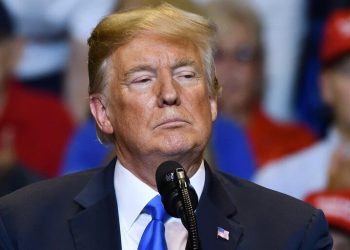If you are systematically engaged in lawbreaking, lawyers can be very annoying. They sue, and their suits may lead courts to declare your actions illegal.
So Donald Trump, who has launched his second term with a blizzard of blatantly illegal actions, many of which have been suspended by the courts, has decided to address the problem at its root. He’s targeting lawyers, punishing them for doing nothing more than filing lawsuits he opposes, or hiring lawyers he does not like. He has issued unprecedented executive orders penalizing five of the nation’s major law firms, and more are likely to come. These tactics, blatantly illegal, are designed with one goal in mind: to chill lawyers’ willingness to challenge his illegal actions. They are a fundamental attack on the foundation of the rule of law. And they are achieving their purpose, not because they are legal – they obviously are not – but because too many law firms are surrendering to Trump’s illegal demands.
These measures take a page from the book of other autocrats around the world. Just last week, the Turkish president Recep Tayyip Erdoğan’s government detained lawyers for representing people protesting the arrest of his main political rival, Istanbul’s mayor. Erdoğan’s attacks on the legal profession stretch back more than a decade. Putin’s Russia is persecuting lawyers for the late Russian opposition leader Alexei Navalny simply for carrying out their professional duties. And in Maduro’s Venezuela, lawyers defending political detainees are being subjected to surveillance, threats, arrest and smear campaigns, increasingly leaving the detainees without access to counsel of their choice.
Trump’s executive orders make no attempt to hide their unconstitutional retaliatory motive. They single out individual law firms by name, complain about the firm’s cases and association with individuals Trump regards as his enemies, and impose a series of sanctions: lifting security clearances for all their lawyers, barring federal business with them, excluding them from federal buildings (which means they can’t even go to court) and requiring federal contractors to disclose whether they have used the firm. In an order targeting WilmerHale, one of the nation’s most prestigious law firms, Trump complains that it hired Robert Mueller, the former FBI director who investigated possible Russian interference in the 2016 election.
Another order, directed against the law firm Jenner & Block, targets its pro bono representation of transgender individuals and immigrants. Still another order punishes the law firm Perkins Coie for, among other things, filing suits challenging voter identification laws as impermissibly barring access to the ballot. And an executive memorandum, issued on 22 March, threatens to sanction lawyers and their firms – including in particular those at the immigration bar – who litigate against the federal government. The order directs the attorney general to review all lawsuits against the federal government over the past eight years and going forward, and to recommend to Trump sanctions against lawyers or firms involved in cases the attorney general deems frivolous.
These orders are blatantly unconstitutional. Filing lawsuits to vindicate voting rights, LGBTQ+ equality or fair treatment of immigrants is protected by the first amendment, which guarantees the right to “petition for a redress of grievances”. And law firms also have a first amendment right to choose whom to hire as partners, regardless of what Trump thinks of their lawyering skills. The orders are classic government retaliation for the exercise of first amendment rights. WilmerHale, Jenner and Perkins Coie each immediately challenged the orders in federal court, and in each case judges have blocked the order the day the suit was filed. The government has no even colorable defense for what the president is doing.
But, disturbingly, four other major firms – Paul Weiss, Skadden Arps, Milbank and Willkie Farr – have succumbed to Trump’s illegal demands, the latter three even before an executive order was issued against them. Shockingly, each firm has agreed to commit millions of dollars in pro bono work to causes that Trump supports, as well as accepting lawless intrusions on their hiring and employment practices. The firms could have sued, and would certainly have prevailed had they done so, for the same reasons the other three firms won. No judge would uphold such orders. But the firms chose instead to compromise, fearing that, even if they won in court, they would lose in the market, as clients who needed to do business with the federal government would abandon them for firms that had not been placed on Trump’s “enemies list”. They put their considerable take-home pay over their principles – and have been roundly and justly criticized within the legal community for having done so. This is precisely the kind of “anticipatory obedience” that the Yale historian Timothy Snyder and New York Times columnist M Gessen warn marks the beginning of autocratic takeovers.
If the United States is to be governed by the rule of law, lawyers and law firms cannot bow down to such unlawful assaults on the legal profession’s independence. Their duties as officers of the court require them to stand and fight. If lawyers are afraid to challenge unlawful actions by the administration, Trump will be free to act extra-legally. It has long been a bedrock of the American system that anyone harmed by official action can challenge that action in court, even where the official is the president himself. But that depends on lawyers maintaining their independence.
Trump’s first two months have seen widespread attacks on those most vulnerable – immigrants, transgender individuals and members of other minority groups. Lawyers and big corporate law firms are not exactly the vulnerable themselves. Trump is attacking them because they can defend the vulnerable, and block his illegal actions in court. His executive orders have in particular objected to the firms’ pro bono work, done without fee, for indigent clients, often seeking to hold the government accountable. One by one, Trump is picking off his potential opposition, publicly reveling in its growing acquiescence. As each law firm folds, looking only to its own bottom line, it undermines not only its own standing, but the legal profession itself.
By contrast, the three law firms who have challenged Trump’s executive orders – and the lawyers who have taken on their cases – are fighting not only for their own rights, but for the rule of law. Their principled resistance is precisely what we need if the United States is to remain a constitutional democracy.
#Trumps #attacks #law #firms #attack #law #David #Cole #Amrit #Singh





















